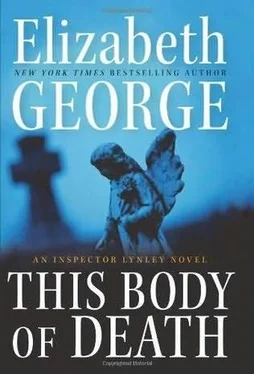“Jayson Druther?”
“And he confirms. He says it was about an order for Cuban cigars. He couldn’t find them. Her brother phoned her as well, as did Frazer Chaplin, and…I admit I’ve saved what’s most intriguing for last. There was a call from Gordon Jossie.”
“Was there indeed.”
“There was his number, large as life. Same one as on the postcards he put up round the portrait gallery and Covent Garden. Interesting, isn’t it?”
“What’ve we got on the mobile phone towers?” Lynley asked. “Anything yet?” They’d want to track the location of the callers when the calls to Jemima’s mobile had been made, and checking the pinging off the mobile phone towers was the way to do this. It couldn’t pinpoint exactly where a caller had been, but it would get them close to the spot.
“John’s checking into that. It’s going to take time.”
“Calls following her death?”
“There were messages from Yolanda, from Rob Hastings, from Jayson Druther, from Paolo di Fazio.”
“Nothing from Abbott Langer, then, or Frazer Chaplin? Nothing from Jossie?”
“Nothing at all. Not afterwards. Suggests to me that one of those blokes knew there was no point in phoning, doesn’t it?”
“What about calls she made on the day she died?”
“Three to Frazer Chaplin-this is in advance of the one she received from him-and one to Abbott Langer. They need talking to again, those two.”
Lynley told her he would get on to that. He was yards away from the ice rink.
He added what Yolanda had said about her last meeting with Jemima. If Jemima had sought advice from the psychic about hard truths needing to be spoken to someone, it seemed to Lynley that those hard truths were meant to be heard by a man. Since, if the psychic was to be believed, Jemima had apparently been in love with the Irishman, one of the possibilities was that he was the recipient of those hard truths that she needed to tell. Of course, Lynley told the superintendent, he was not blind to the fact that there were other equally strong potential recipients of Jemima Hastings’ message: Abbott Langer would be one of them, as would Paolo di Fazio, Jayson Druther, Yukio Matsumoto, and any other man whose life touched upon hers, such as Gordon Jossie as well as her own brother, Rob.
“Go with Chaplin and Langer first,” Ardery said when he’d finished. “We’ll keep digging at this end.” She was silent for a moment before adding, “Hard truths? That’s what she told you? D’you reckon Yolanda’s telling her own truths, Thomas?”
Lynley considered what Yolanda had said about him, about his aura, about the return of a woman-gone but not, and never forgotten-into his life. He had to admit that he didn’t know how much of what Yolanda said was based on intuition, how much on watching for subtle reactions in her listener as she spoke, and how much on what she really knew from the “other side.” He reckoned they could discount just about everything she proclaimed that had no basis in cold facts, and he said, “But when it comes to Jemima, the psychic wasn’t making predictions, guv. She was reporting on what Jemima actually told her.”
“Isabelle,” she said. “Not guv. We’d got to Isabelle, Thomas.”
He was quiet for a moment, considering this. He finally said, “Isabelle, then. Yolanda was reporting on what Jemima told her.”
“But she also has a vested interest in leading us astray if she herself put that handbag in the bin.”
“True. But someone else could have put it there. And she could be protecting that person. Let me talk to Abbott Langer.”
THE MOBILE PHONE records were simultaneously good news and bad news for Isabelle. Anything that led them in the direction of the killer had to be a plus. At the same time, however, anything that led them away from Yukio Matsumoto as that killer made her own position perilous. It was one thing if a killer attempting to run from the police was hit by a taxi and severely injured. This was bad for her situation, but it wasn’t fatal. It was quite another thing if an innocent psychiatric patient off his meds was hit while in the act of fleeing God-only-knew-what, cooked up by his feverish brain. That didn’t look good in the present climate of people being mistaken for terrorists and taken out by gunfire in hideous error. The long and short of it was that, mobile phone calls or not, they needed something definitive-something absolutely ironclad-to be the nail in Matsumoto’s coffin.
She had watched the Met’s preemptive press conference, which Stephenson Deacon and the Directorate of Public Affairs had put together. She had to admit that the press office was as smooth and cool as sculpted marble, but they would be, having had years of practice in the subtle art of imparting information meant to be explicative when the very last thing they wanted was to give out incriminating details about any officer from or any action taken by the Met. Deacon and Hillier himself had appeared before the cameras. Hillier had made the prepared statement. The accident in Shaftesbury Avenue was deemed unfortunate, undesirable, unavoidable, and every other un that could be excavated from someone’s thesaurus. But the officers were not armed, he intoned, they had clearly and repeatedly identified themselves as officers, and if a suspect runs from the police when the police want to question him, those police are going to give chase for obvious reasons. In a murder investigation, the safety of the public at large trumps other considerations, especially when someone is making an attempt to evade an interaction with the police. Who those police were by name Hillier didn’t divulge. That would come later, Isabelle knew, in the unfortunate event of someone needing to be thrown to the wolves.
Isabelle had a good idea of who that person would be. There were follow-up questions from journalists at the press conference, but she didn’t listen to them. She got back to work and she was still at work when a phone call came in from Sandra Ardery. The call didn’t come through her mobile, which was clever of Sandra, Isabelle thought, since she would have recognised the number and refused to answer. Rather, the call came through channels, ending up on Dorothea Harriman’s line. Harriman came personally to share the blessed news: Sandra Ardery would be that grateful for “just a word with you, guv. She says it’s about the boys?” That inflection on the noun indicated Harriman’s unfounded assurance that surely Isabelle would jump to talk to anyone who had something to say about “the boys.”
Isabelle restrained herself from snatching up the phone and barking, “What?” at Sandra. She had nothing against Bob’s wife, who at the very least always made an heroic attempt to remain a neutral party in Isabelle’s disputes with her former husband. She nodded at Harriman and took the call.
Sandra’s voice was breathy, as always. For some reason she spoke like someone either doing a bad impersonation of Marilyn Monroe or exhaling clouds of cigarette smoke although she didn’t indulge in the latter as far as Isabelle knew. “Bob said he tried to reach you earlier,” Sandra told her. “He left a message on your mobile? I did tell him to try your office, but…You know Bob.”
Ah yes, Isabelle thought. She said, “I’ve been caught up in things here, Sandra. We’ve had an incident with a bloke in the street.”
“Are you somehow involved in that? How dreadful. I saw the news conference. It interrupted my programme.”
Her programme was medical, Isabelle knew. Not a daily hospital drama, this, but rather an intense scientific exploration of debilitating conditions and numerous afflictions-fatal and otherwise. Sandra watched it religiously and took copious notes as a means of monitoring her children’s health. As a result, she regularly ferried them to their paediatrician in a state of panic, most recently because of a rash on the younger girl’s arm, which Sandra had firmly believed was an outbreak of something called Morgellons disease. Sandra’s obsession with this programme was the single subject that Isabelle and Bob Ardery could actually share a chuckle over.
Читать дальше












